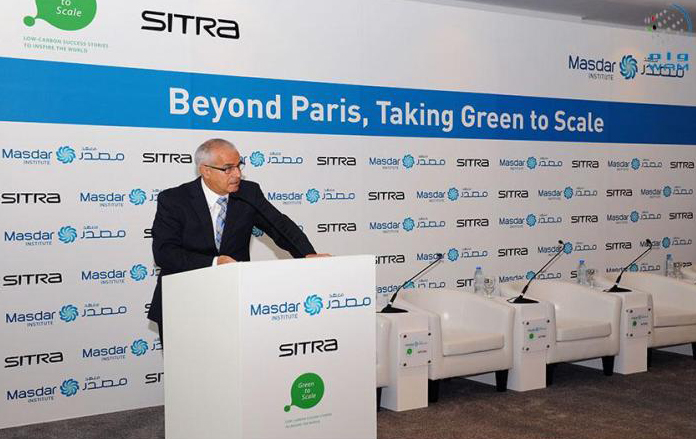ID :
394279
Wed, 01/20/2016 - 11:00
Auther :
Shortlink :
https://oananews.org//node/394279
The shortlink copeid
Masdar Institute and Finnish think tank Sitra’s ‘Green to Scale’ report highlights 17 solutions to cut global emissions by one quarter

ABU DHABI, 20th January, 2016 (WAM) -- The Masdar Institute of Science and Technology, an independent, research-driven graduate-level university focused on advanced energy and sustainable technologies, and the independent public Finnish think-tank, Sitra, today jointly hosted the Middle East launch of the Green to Scale report that assesses a number of high-impact climate change mitigating solutions from around the world and analyses the scope of their implementation in other countries.
The report is significant as the Middle East launch comes shortly after the COP21 Paris conference in which countries across the globe have agreed to reduce emissions. The report highlights 17 tools among which some could help countries to achieve their targeted emission reductions and go beyond them.
The ceremony was held on the sidelines of the World Future Energy Summit, which is being organised as part of the Abu Dhabi Sustainable Week 2016 at the Abu Dhabi National Exhibition Centre.
Riitta Swan, Finnish Ambassador to the UAE, Ahmed Djoghlaf, Co-Chair of the Durban Platform for Enhanced Action, ADP, at the United Nations Framework Convention on Climate Change, UNFCCC, officials from Sitra, International Renewable Energy Agency, IRENA, and Masdar Institute management, as well as other partners, attended the event.
Answering how far the world can go by simply scaling up proven low-carbon solutions, the report strives to show that 17 solutions from five different sectors can cut global emissions by a quarter compared with today's levels, if scaled up efficiently.
Masdar Institute participated in developing the report by contributing analysis, communications and outreach, including the provision of regional expertise, data, examples and information about existing low-carbon solutions. Dr. Steve Griffiths, Vice President of Research, represents Masdar Institute as a member of the project’s steering group and Dr. Sgouris Sgouridis, Associate Professor of Engineering Systems and Management, is a deputy member of the steering group.
The Green to Scale analysis suggests 17 proven solutions to reduce greenhouse gas emissions that countries worldwide can implement best practice solutions for climate change. The report shows that the aggregate annual cost of deploying all 17 solutions globally, would be, at maximum, in the range of US$94 billion a year in 2030, yet could even provide net savings of up to US$171 billion per year. The report claims that if 17 climate solutions were adopted internationally, the world would eliminate approximately 12 billion tons of greenhouse gas emissions by 2030.
Dr. Behjat Al Yousuf said, "Masdar Institute is pleased to contribute to the Green to Scale report, and emphasises the value of propagating tried and tested green energy solutions in the interest of greater sustainability and reduced global climate change. By providing the project with our insight and experience, Masdar Institute has ensured that it includes guidance of relevance to this part of the world, while also demonstrating the extent of our expertise in enabling the reduction of the effects and contributions of climate change. We hope more countries will eventually adopt the measures recommended in the report to help tackle global climate change."
Mikko Kosonen, President of Sitra, said, "We already have climate solutions that are proven to work at the level of nations. The joint Sitra and Masdar Institute report shows that these off-the-shelf solutions can make a big contribution to closing the emissions gap, without breaking the bank, and with no need for out-of-this-world inventions."
Other organisations and institutions that were part of the Green to Scale analysis project include the Alberto Luiz Coimbra Institute for Graduate Studies and Research in Engineering, Brazil, the International Finance Corporation (IFC) of the World Bank Group, the Centro Mexicano de Derecho Ambiental (CEMDA) of Mexico, the Ethiopian Development Research Institute (EDRI), the Institute for Global Environmental Strategies (IGES) of Japan, the European Climate Foundation (ECF) based in the Netherlands, the Stockholm Environment Institute (SEI), the World Resources Institute (WRI) based in the US, the Renmin University of China, and the United Nations Environment Program’s (UNEP) DTU Partnership in Denmark. – Emirates News Agency, WAM - http://www.wam.ae/en/news/emirates/1395290509529.html





